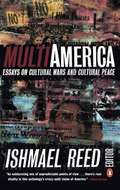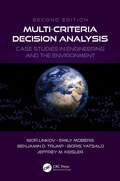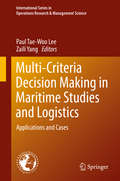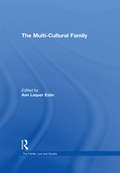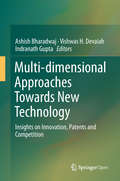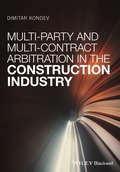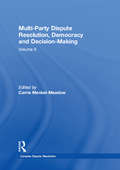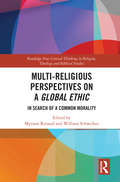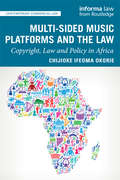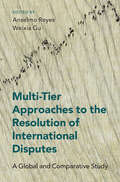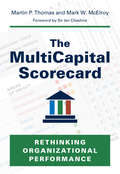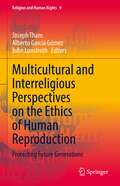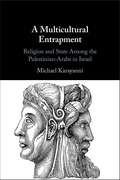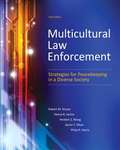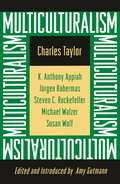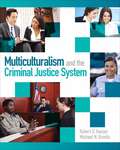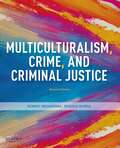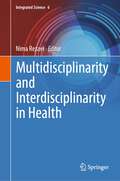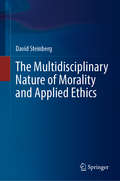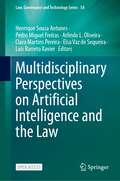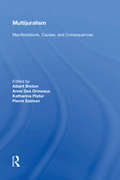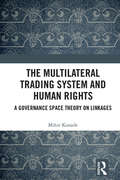- Table View
- List View
Muller vs. Oregon: A Brief History with Documents
by Nancy WolochIn 1908 the Supreme Court unanimously upheld an Oregon law that set a ten-hour limit on the workdays of women in factories and laundries. Using lawyers' briefs, arguments over single-sex protective laws, and other major court decisions, Nancy Woloch examines a moment in which constitutional history, women's history, and progressive politics converged.
Multi-America: Essays On Cultural Wars And Cultural Peace
by Ishmael ReedIs there such a thing as an American culture? Should we conform to a monocultural ideal in this country? No, says Ishmael Reed, a long-time critic of the mainstream media which, he insists, marginalizes non-Anglo, non-Yankee cultures. In this refreshing anthology Reed and other African-American, Native-American, Asian-American, Italian-American, Latin-American, and Irish-American writers come together to provide perspectives frequently omitted from the discussion of race in the United States. Speaking out on a broad variety of issues-including assimilation, racial conflicts between minorities, the gay rights movement, victimization and stereotyping -- these essays take us far beyond the issues of black vs. white and often veer toward the controversial. Amiri Baraka, Bharati Mukerhjee, Ana Castillo, Haki Madhubuti, Frank Chin, Gerald Horne, Barbara Smith, Miguel Algarin are just a few of the notable writers, teachers, students, and professionals included here. Stimulating, unpredictable, and provocative, Multi-America introduces the authentic voices of Rainbow America in all their diverse, angry, proud, celebratory glory.
Multi-Criteria Decision Analysis: Case Studies in Engineering and the Environment (Environmental Assessment and Management)
by Igor Linkov Emily Moberg Benjamin D. Trump Boris Yatsalo Jeffrey M. KeislerDecision analysis has become widely recognized as an important process for translating science into management actions. With climate change and other systemic threats as driving forces in creating environmental and engineering problems, there is a great need for understanding decision making frameworks through a case-study based approach. Management of environmental and engineering projects is often complicated and multidisciplinary in scope and nature, thus issues that arise can be difficult to solve analytically. Multi-Criteria Decision Analysis: Case Studies in Engineering and the Environment provides detailed description of MCDA methods and tools and illustrates their applications through case studies focused on sustainability and system engineering applications. New in the Second Edition: Addresses current and emerging environmental and engineering problems Includes seven new case studies to illustrate different management situations applicable at the international level Builds on real case studies from recent and relevant environmental and engineering management experience Describes advanced MCDA techniques and extensions used by practitioners Provides corresponding decision models implemented using the DECERNS software package Gives a more holistic approach to teaching MCDA methodology with a focus on sustainable solutions and adoption of new technologies, including nanotechnology and synthetic biology Given the novelty and inherent applicability of this decision-making framework to the environmental and engineering fields, a greater number of teaching tools for this topic need to be made available. This book provides those teaching tools, covering the breadth of the applications of MCDA methodologies with clear explanations of the MCDA process. The case studies are implemented in the DECERNS software package, allowing readers to experiment and explore and to understand the full process by which environmental managers assess these problems. This book is a great resource for professionals and students seeking to learn decision analysis techniques and apply similar frameworks to environmental and engineering projects
Multi-Criteria Decision Making in Maritime Studies and Logistics
by Paul Tae-Woo Lee Zaili YangThis book describes a wide range real-case applications of Multi-Criteria Decision Making (MCDM) in maritime related subjects including shipping, port, maritime logistics, cruise ports, waterfront developments, and shipping finance, etc. In such areas, researchers, students and industrialists, in general, felt struggling to find a step-by-step guide on how to apply MCDM to formulate effective solutions to solving real problems in practice. This book focuses on the in-depth analysis and applications of the most well-known MDCM methodologies in the aforementioned areas. It brings together an eclectic collection of twelve chapters which seek to respond to these challenges. The book begins with an introduction and is followed by an overview of major MCDM techniques. The next chapter examines the theory of analytic hierarchy process (AHP) in detail and investigates a fuzzy AHP (FAHP) approach and its capability and rationale in dealing with decision problems of ambiguous information. Chapter 4 proposes a generic methodology to identify the key factors influencing green shipping and to establish an evaluation system for the assessment of shipping greenness. In Chapter 5, the authors describe a new function of fuzzy Evidential Reasoning (ER) to improve the vessel selection process in which multiple criteria with insufficient and ambiguous information are evaluated and synthesized. Chapter 6 presents a novel methodology by using an Artificial Potential Field (APF) model and the ER approach to estimate the collision probabilities of monitoring targets for coastal radar surveillance. Chapter 7 develops the inland port performance assessment model (IPPAM) using a hybrid of AHP, ER and a utility function. The next chapter showcases a challenging approach to address the risk and uncertainty in LNG transfer operations, by utilizing a Stochastic Utility Additives (UTA) method with the help of the philosophy of aggregation-disaggregation coupled with a robustness control procedure. Chapter 9 uses Entropy and Grey Relation Analysis (GRA) to analyze the relative weights of financial ratios through the case studies of the four major shipping companies in Korea and Taiwan: Evergreen, Yang Ming, Hanjin and Hyundai Merchant Marine. Chapter 10 systemically applies modern heuristics to solving MCDM problems in the fields of operation optimisation in container terminals. Arguing that bunkering port selection is typically a multi-criteria group decision problem, and in many practical situations, decision makers cannot form proper judgments using incomplete and uncertain information in an environment with exact and crisp values, in Chapter 11, the authors propose a hybrid Fuzzy-Delphi-TOPSIS based methodology with a sensitivity analysis. Finally, Chapter 12deals with a new conceptual port performance indicators (PPIs) interdependency model using a hybrid approach of a fuzzy logic based evidential reasoning (FER) and a decision making trial and evaluation laboratory (DEMATEL).
The Multi-Cultural Family (The Family, Law and Society)
by Ann Laquer EstinWith the accelerating movement of individuals and families across national borders, the intersections of cultural and legal frameworks have become increasingly complex. The Multi-Cultural Family collects essays from around the world on the challenges of legal pluralism, minority religious communities and customary or indigenous law, with attention paid to marriage and divorce, as well as child custody and adoption, family violence and dispute resolution.
Multi-dimensional Approaches Towards New Technology: Insights on Innovation, Patents and Competition
by Ashish Bharadwaj Vishwas H. Devaiah Indranath GuptaThis open access edited book captures the complexities and conflicts arising at the interface of intellectual property rights (IPR) and competition law. To do so, it discusses four specific themes: (a) policies governing functioning of standard setting organizations (SSOs), transparency and incentivising future innovation; (b) issue of royalties for standard essential patents (SEPs) and related disputes; (c) due process principles, procedural fairness and best practices in competition law; and (d) coherence of patent policies and consonance with competition law to support innovation in new technologies. Many countries have formulated policies and re-oriented their economies to foster technological innovation as it is seen as a major source of economic growth. At the same time, there have been tensions between patent laws and competition laws, despite the fact that both are intended to enhance consumer welfare. In this regard, licensing of SEPs has been debated extensively, although in most instances, innovators and implementers successfully negotiate licensing of SEPs. However, there have been instances where disagreements on royalty base and royalty rates, terms of licensing, bundling of patents in licenses, pooling of licenses have arisen, and this has resulted in a surge of litigation in various jurisdictions and also drawn the attention of competition/anti-trust regulators. Further, a lingering lack of consensus among scholars, industry experts and regulators regarding solutions and techniques that are apposite in these matters across jurisdictions has added to the confusion. This book looks at the processes adopted by the competition/anti-trust regulators to apply the principles of due process and procedural fairness in investigating abuse of dominance cases against innovators.
Multi-Party and Multi-Contract Arbitration in the Construction Industry
by Dimitar KondevMulti-Party and Multi-Contract Arbitration in the Construction Industry provides the first detailed review of multi-party arbitration in the international construction sector. Highly practical in approach, the detailed interpretation and assessment of the arbitration of multi-party disputes will facilitate understanding and decision making by arbitrators, clients and construction contractors.
Multi-Party Dispute Resolution, Democracy and Decision-Making: Volume II (Complex Dispute Resolution)
by Carrie Menkel-MeadowThe articles selected for this volume draw on game theory, political science, psychology, sociology and anthropology to consider how the process of dispute resolution is altered, challenged and made more complex by the presence of multiple parties and/or multiple issues. The volume explores issues of coalition formation, defection, collaboration, commitments, voting practices, and joint decision making in settings of increasing human complexity. Also included are examples of concrete uses of deliberative democracy processes taken from new applications of complex dispute resolution theory and practice. The selected essays represent the latest theoretical advances and challenges in the field and demonstrate attempts to use dispute resolution theory in a wide variety of settings such as political decision making and policy formation; regulatory matters; environmental disputes; healthcare; community disputes; constitutional formation; and in many other controversial issues in the polity.
Multi-Religious Perspectives on a Global Ethic: In Search of a Common Morality (Routledge New Critical Thinking in Religion, Theology and Biblical Studies)
by Myriam Renaud William SchweikerRatified by the Parliament of the World’s Religions in 1993 and expanded in 2018, "Towards a Global Ethic (An Initial Declaration)," or the Global Ethic, expresses the minimal set of principles shared by people—religious or not. Though it is a secular document, the Global Ethic emerged after months of collaborative, interreligious dialogue dedicated to identifying a common ethical framework. This volume tests and contests the claim that the Global Ethic’s ethical directives can be found in the world’s religious, spiritual, and cultural traditions. The book features essays by scholars of religion who grapple with the practical implications of the Global Ethic’s directives when applied to issues like women’s rights, displaced peoples, income and wealth inequality, India’s caste system, and more. The scholars explore their respective religious traditions’ ethical response to one or more of these issues and compares them to the ethical response elaborated by the Global Ethic. The traditions included are Hinduism, Engaged Buddhism, Shi‘i Islam, Sunni Islam, Confucianism, Protestantism, Catholicism, Judaism, Indigenous African Religions, and Human Rights. To highlight the complexities within traditions, most essays are followed by a brief response by an expert in the same tradition. Multi-Religious Perspectives on a Global Ethic is of special interest to advanced students and scholars whose work focuses on the religious traditions listed above, on comparative religion, religious ethics, comparative ethics, and common morality.
Multi-sided Music Platforms and the Law: Copyright, Law and Policy in Africa (Contemporary Commercial Law)
by Chijioke Ifeoma OkorieMulti-Sided Music Platforms and the Law explores the legal and regulatory frameworks surrounding copyright protection, competition and privacy concerns arising from the way multi-sided platforms use copyright-protected content in digital advertising. This book suggests how stakeholders in Africa, and their advisors, may ingenuously reform and apply various legal and regulatory frameworks to address these issues which arise from the manner in which multi-sided platforms use copyright-protected content in digital advertising. The book critically engages with the regulatory efforts in other jurisdictions, particularly the EU, with a view to bringing an African perspective to the debate and practice. It undertakes a consideration of this issue by asking how multi-sided platforms may be deployed in a manner that continues innovative uses of copyright content while protecting the economic freedom of African copyright owners as small businesses. Providing the first pro-Africa approach to the regulation of multi-sided platforms, particularly with reference to music, this book focuses on key aspects of digital commercial activity and highlights the main challenges and opportunities for its regulation. It will be of interest to lawyers, policymakers and students across Nigeria, South Africa, and internationally among the African Union, European Union and beyond. .
Multi-Tier Approaches to the Resolution of International Disputes: A Global and Comparative Study
by Anselmo Reyes Weixia GuMulti-tier dispute resolution (MDR) entails an early attempt at mediation followed by arbitration or litigation if mediation is unsuccessful. Seemingly, everyone acknowledges MDR's attractiveness as a means of resolving disputes due to its combination of the flexibility and informality of mediation with the rigour and formality of arbitration or litigation. Yet, the question is why, except in China and some Asian jurisdictions, MDR is not resorted to around the world and MDR clauses in commercial contracts remain relatively uncommon. This book responds to that question by (1) surveying global regulatory approaches frameworks for MDR, (2) comparing MDR trends in Asia and the wider world, (3) identifying MDR's strengths and weaknesses, and (4) prescribing ways to address MDR's weaknesses (the enforceability of MDR clauses, the difficulties arising when the same person acts as mediator and decision-maker in the same dispute, and the enforcement of mediated settlement agreements resulting from MDR).
The MultiCapital Scorecard: Rethinking Organizational Performance
by Martin P. Thomas Mark W. McelroyFor decades now, organizations have been struggling to find the best way to address their social and environmental responsibilities alongside their economic obligations. In other words, they want to know how best to effectively manage their operations based on a triple bottom line (3BL)--one that reflects social, environmental, and economic performance. Recently, an international standard for integrated reporting has emerged that in principle emphasizes the importance of managing toward a triple bottom line. But it fails to provide specific guidance on how to do so. Organizations have been left to their own devices to respond. How should 3BL management actually be done? In this book, sustainability and performance experts Martin Thomas and Mark McElroy introduce the world's most advanced 3BL performance accounting methodology: The MultiCapital Scorecard. It is the first context-based integrated measurement, management, and reporting system. And, it can help corporations, public institutions, and other organizations answer the question they should be asking themselves for every aspect of their operations: "How much is enough for us to be sustainable?" The answers set internal performance standards against which operations and their impacts can be measured. Nothing less will do! The MultiCapital Scorecard describes this open-source methodology, which consists of a structured, quantitative measurement and reporting system that complies with international standards for 3BL integrated measurement and reporting. Moreover, the MultiCapital Scorecard is designed to help organizations assess their own 3BL performance in their own contexts with context-based metrics of their own choosing. An eminently practical management aid for integrated thinking, it can be tailored to any organization's needs. The authors also describe how and why businesses are gradually shifting from managing impacts on only one type of capital (economic) to managing impacts on multiple types. They also provide detailed examples of worked reports, showing how organizations might develop and quantify the interim and long-term goals to meet their obligations to their employees, community, shareholders, and the environment. The examples also show how an organization can use the Multicapital Scorecard methodology to assess their progress in meeting those goals, and convey that progress to their stakeholders.
Multicultural and Interreligious Perspectives on the Ethics of Human Reproduction: Protecting Future Generations (Religion and Human Rights #9)
by Joseph Tham Alberto Garcia Gómez John LunstrothThis book includes a number of distinct religious and secular views on the anthropological, ethical and social challenges of reproductive technologies in the light of human rights and in the context of global bioethics. It includes contributions of bioethics experts from six major religions—Buddhism, Confucianism, Christianity, Islam, Hinduism and Judaism—as well as secular authors. The chapters include commentaries discussing the content cross-religious/secular tradition to give a comparative perspective. Not only the volume editors but also the contributing authors took part in reviewing each others’ chapter making this a unique collected volume, not common in interreligious dialogue today. This text appeals to researchers and students working in the fields of bioethics and religious/secular studies.
A Multicultural Entrapment: Religion and State Among the Palestinian-Arabs in Israel
by Michael KarayanniThe religion and state debate in Israel has overlooked the Palestinian-Arab religious communities and their members, focusing almost exclusively on Jewish religious institutions and norms and Jewish majority members. Because religion and state debates in many other countries are defined largely by minority religions' issues, the debate in Israel is anomalous. Michael Karayanni advances a legal matrix that explains this anomaly by referencing specific constitutional values. At the same time, he also takes a critical look at these values and presents the argument that what might be seen as liberal and multicultural is at its core just as illiberal and coercive. In making this argument, A Multicultural Entrapment suggests a set of multicultural qualifications by which one should judge whether a group based accommodation is of a multicultural nature.
Multicultural Law Enforcement: Strategies for Peacekeeping in a Diverse Society, Sixth Edition
by Robert M. Shusta Deena R. Levine Herbert Z. Wong Aaron T. Olson Philip R. HarrisMulticultural Law Enforcement: Strategies for Peacekeeping in a Diverse Society, 6e is designed for use in criminal justice and social/behavioral science courses, as well as law enforcement in-service training classes and police academies. The textbook is also directly applicable in colleges, university and vocational programs offering emergency services for: police, fire and rescue, emergency medical, emergency management, 911, military as well as civil emergency services. This comprehensive, student-friendly text, like no other on the market, is designed for students who will become part of a diverse workforce and who, in their future careers, will encounter citizens from many backgrounds. Multicultural Law Enforcement: Strategies for Peacekeeping in a Diverse Society, 6e, addresses topics of key concern to criminal justice and emergency service professionals, including cultural awareness, prejudice, bias, racial profiling, hate and bias crimes, and cross-cultural communication. It covers issues of workforce diversity such as the recruitment and retention of minorities. The content deepens readers' understanding of many demographic groups in our nation's multicultural population, broadly focusing on ethnicity, race, culture and sexual orientation as well as on other societal sub-groups, including immigrants, refugees, homeless, mentally ill and gangs. The book also addresses multicultural issues that relate to terrorism, homeland security and disaster preparedness. The information and insights contained in the text will no doubt contribute to the increasing need for professionalism required of law enforcement in responding to multicultural diversity issues. Using examples from case studies and established guidelines within law enforcement, the text focuses squarely on the contact police officers and civilian employees have with the community, emphasizing the importance of cultural awareness, understanding, and respect. In adopting this textbook, instructors will have access to a complete learning package designed to stimulate students' higher levels thinking and awareness. Teaching and Learning Experience This book serves as a focused roadmap for law enforcement with its comprehensive look at the impact of cross-cultural and diversity challenges within the criminal justice field. It provides: Extensive, in-depth coverage: the scope sets this text apart from its competitor Culture-specific chapters: exposes readers to an understanding of cultural, racial and ethnic groups without relying on stereotypical descriptions Complete learning package: makes course preparation and learning easier
Multiculturalism: Expanded Paperback Edition (The University Center for Human Values Series #15)
by Charles TaylorA new edition of the highly acclaimed book Multiculturalism and "The Politics of Recognition," this paperback brings together an even wider range of leading philosophers and social scientists to probe the political controversy surrounding multiculturalism. Charles Taylor's initial inquiry, which considers whether the institutions of liberal democratic government make room--or should make room--for recognizing the worth of distinctive cultural traditions, remains the centerpiece of this discussion. It is now joined by Jürgen Habermas's extensive essay on the issues of recognition and the democratic constitutional state and by K. Anthony Appiah's commentary on the tensions between personal and collective identities, such as those shaped by religion, gender, ethnicity, race, and sexuality, and on the dangerous tendency of multicultural politics to gloss over such tensions. These contributions are joined by those of other well-known thinkers, who further relate the demand for recognition to issues of multicultural education, feminism, and cultural separatism. Praise for the previous edition:
Multiculturalism And The Criminal Justice System
by Robert D. Hanser Michael D. GomilaMulticulturalism and the Criminal Justice System, 1e, is the contemporary text that addresses diversity and multicultural issues in the policing, judicial, correctional, and juvenile justice segments of the criminal justice system. This text contains numerous visual aids that showcase data that is current and relevant. Unlike the competition, this text is comprehensive in its portrayal of various minority groups, addresses the issues from a systemic view of criminal justice, is practitioner-driven, and is well organized. <P><P> Teaching and Learning Experience <P><P> This book fulfills the need for a thorough and up-to-date text on multicultural issues facing criminal justice practitioners. It provides: <P><P> Comprehensive content: Students will learn about multiculturalism in a manner that has both breadth and depth <P><P> U p-to-date coverage of multi - cultural issues facing criminal justice practitioners : Examines perspectives from the practitioner, offender, and victim vantage point <P><P> Exceptional pedagogical tools and support for flexible approaches to teaching and learning:Encourages students to develop critical thinking skills with numerous examples and exercises, and makes class preparation quick and easy with innovative features for instructors
Multiculturalism, Crime, and Criminal Justice
by Robert McNamara Ronald BurnsMulticulturalism, Crime, and Criminal Justice provides an overview of the problems and promises of cultural diversity in society and within all facets of the criminal justice system. It focuses on how different marginalized groups—African Americans, Hispanic Americans, Asian Americans, Native Americans, women, the LGBTQ community, the elderly, and juveniles—are impacted by law enforcement, the courts, and correctional agencies, addressing the issues that each group faces. It also examines how multiculturalism affects those who work within the criminal justice system, including members
Multiculturalism, Crime, And Criminal Justice
by Robert McNamara Ronald BurnsMulticulturalism, Crime, and Criminal Justice, Second Edition, provides an overview of the problems and promises of cultural diversity in society and within all facets of the criminal justice system. It focuses on how different marginalized groups--African Americans, Hispanic Americans, Asian Americans, Native Americans, women, the LGBTQ community, the elderly, and juveniles--are impacted by law enforcement, the courts, and correctional agencies, addressing the issues that each group faces. It also examines how multiculturalism affects those who work within the criminal justice system, including members of minority groups.
Multidisciplinarity and Interdisciplinarity in Health (Integrated Science #6)
by Nima RezaeiThe contributed volume "Multidisciplinarity and Interdisciplinarity in Health" is a health-centered volume of the Integrated Science Book series. Lack of confidence, lack of expertise, complexities of healthcare, the confusing nature of healthcare environments, and lack of organization and standardization can become obstacles to successful communication. This volume establishes how extensive is the interface between formal sciences and medical sciences on health-related issues. The book provides an overview of the value of the integration of formal, biological, and medical sciences and related products, i.e., health informatics and biomedical engineering, to frame a holistic approach to health systems, healthcare, medical practice, drug discovery, and medical device design. The book also focuses on innovative solutions to the most critical issues of different health crisis, including obesity, infectious outbreaks, and cancer that can be found by using an integrative approach. It also contains the fascinating crossroads between medical sciences, physics, and mind that is discussed from multiple perspectives on cognition, neuroscience, and psychiatry. These multidisciplinary considerations will expand the concepts of creativity, leadership, aesthetics, empathy and mental health.
The Multidisciplinary Nature of Morality and Applied Ethics
by David SteinbergMost people intuitively understand the nature of morality; this tends to belie the fact that morality is more complex, controversial and interesting than generally appreciated. This book provides a comprehensive overview of morality from various disciplines and perspectives. These include ethics and evolution, moral psychology, morality and culture, morality and religion and morality and the law. A chapter on evil illustrates the vulnerability of morality. The book also provides a description and critique of various ethical theories, the difference between a moral obligation and a moral ideal and the views of venerable moral philosophers who argue over issues such as whether objective moral truth exists. A number of practical ethical dilemmas are discussed. The book is written in language accessible to the general reader and will be of interest to members of organizational, governmental, and professional ethics committees, students in ethics fellowships or ethics degree programs, philosophers, and others who want to learn more about morality.
Multidisciplinary Perspectives on Artificial Intelligence and the Law (Law, Governance and Technology Series #58)
by Henrique Sousa Antunes Pedro Miguel Freitas Arlindo L. Oliveira Clara Martins Pereira Elsa Vaz de Sequeira Luís Barreto XavierThis open access book presents an interdisciplinary, multi-authored, edited collection of chapters on Artificial Intelligence (‘AI’) and the Law. AI technology has come to play a central role in the modern data economy. Through a combination of increased computing power, the growing availability of data and the advancement of algorithms, AI has now become an umbrella term for some of the most transformational technological breakthroughs of this age. The importance of AI stems from both the opportunities that it offers and the challenges that it entails. While AI applications hold the promise of economic growth and efficiency gains, they also create significant risks and uncertainty. The potential and perils of AI have thus come to dominate modern discussions of technology and ethics – and although AI was initially allowed to largely develop without guidelines or rules, few would deny that the law is set to play a fundamental role in shaping the future of AI.As the debate over AI is far from over, the need for rigorous analysis has never been greater. This book thus brings together contributors from different fields and backgrounds to explore how the law might provide answers to some of the most pressing questions raised by AI. An outcome of the Católica Research Centre for the Future of Law and its interdisciplinary working group on Law and Artificial Intelligence, it includes contributions by leading scholars in the fields of technology, ethics and the law.
Multijuralism: Manifestations, Causes, and Consequences
by Albert Breton Anne des Ormeaux Katharina Pistor Pierre SalmonAt one level of generality, multijuralism is the coexistence of two or more legal systems or sub-systems within a broader normative legal order to which they adhere, such as the existence of civil and common law systems within the EU. However, at a finer level of analysis multijuralism is a more widespread or common phenomenon and a more fluid reality than the civil law/common law distinction suggests. The papers in this study are therefore rooted in the latter frame of reference. They explore various types of multijural manifestations from the harmonizing potential of international treaties to indigenous law and the use of hard and soft pluralism. In addition, the authors consider the external events which are not part of the processes of multijural adjustment but which serve to influence these processes. Included among these important external events are European integration, the growing importance accorded to human rights, the international practice of law, the growth of the Internet, the globalization of markets and the flow of immigrants. This volume represents some of the most current thinking in the area of multijuralism and is essential reading for anyone interested in the coexistence of legal systems or sub-systems.
Multilateral Environmental Agreements
by Bharat H. DesaiThe present study seeks to examine the genesis, development, and proliferation of multilateral environmental agreements (MEAs) - in-built law-making mechanisms and processes of institutionalization - and their ad hoc treaty-based status and the issue of the legal personality of their secretariats. It provides legal understanding of the location of MEA secretariats within an existing international host institution, as well as discussion of the issue of relationship agreements and interpretation of the commonly used language that triggers such relationships. It places under scrutiny the standard MEA phrase "providing a secretariat," delegation of authority by the host institution to the head of the convention secretariat, possible conflict areas, host country agreement, and the workings of the relationship agreements. The book offers an authoritative account of the growing phenomenon in which an existing international institution provides a servicing base for MEA that, in turn, triggers a chain of legal implications involving the secretariat, the host institution, and the host country.
The Multilateral Trading System and Human Rights: A Governance Space Theory on Linkages
by Mihir KanadeThis book contributes an original theory to understanding human rights and international trade. It offers the ‘governance space’ framework for analysing the linkages and normative relationships between the multilateral trading system (MTS) and human rights regimes. Drawing upon key case studies, the author identifies connecting strands as also gaps in linkage issues. He further examines the ‘right to development’ approach to resolve tensions between these two regimes and demonstrates how the approach may be the most appropriate road map to finding sustainable solutions in balancing human rights and equitable free trade in a complex globalised world. Presenting new legal analyses informed by current debates drawn from international organisations – the World Trade Organization, United Nations, International Labour Organization – governments, civil society and academia as well as global commitments such as the Sustainable Development Goals, the book proposes a systematic and holistic policy intervention. This timely and transdisciplinary text will be of great interest to academics, students and scholars of human rights, international trade, international law, development studies, public policy and governance, economics, politics and international relations. It will also be useful to policymakers, think-tanks, human rights advocates, professionals, lawyers, civil society organisations, non-governmental organisations and trade experts.

